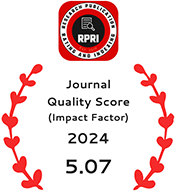Estimation of FLS Gene Expression in Ginger, Grapes and Date Palms using Artemisia annua as a Control Sample
DOI:
https://doi.org/10.55544/jrasb.1.4.15Keywords:
FLS, Z. officinale, V. vinifera, P. dactyliferaAbstract
In the current study, the gene expression of FLS gene prefixes was studied in the leaves of the plants of Zingiber officinale, Vitis vinifera, Phoenix dactylifera. This was done using a sample of Artemisia annua leaves as a control sample and using the reference gene 18s rRNA. Relative Quantification gene expression was relied upon as an approved method to extract results. This gene is responsible for encoding Flavonol synthase, which encodes Flavonol compounds in the flavonoid metabolism chain in various plant kingdom plants that perform multiple plant functions as well as directly related to human health. Ginger Z. officinale was proved to have the highest gene expression at CT= 31.6, while V. vinifera and date palm P. dactylifera followed respectively with values 33.78 and 38.31.
Downloads
Metrics
References
Moriguchi, T., Kita, M., Ogawa, K., Tomono, Y., Endo, T., & Omura, M. (2002). Flavonol synthase gene expression during citrus fruit development. Physiologia plantarum, 114(2), 251-258.
Xu, F., Li, L., Zhang, W., Cheng, H., Sun, N., Cheng, S., & Wang, Y. (2012). Isolation, characterization, and function analysis of a flavonol synthase gene from Ginkgo biloba. Molecular Biology Reports, 39(3), 2285-2296.
Zhang, X., He, Y., Li, L., Liu, H., & Hong, G. (2021). Involvement of the R2R3-MYB transcription factor MYB21 and its homologs in regulating flavonol accumulation in Arabidopsis stamen. Journal of experimental botany, 72(12), 4319-4332.
Lillo, C., Lea, U. S., & Ruoff, P. (2008). Nutrient depletion as a key factor for manipulating gene expression and product formation in different branches of the flavonoid pathway. Plant, cell & environment, 31(5), 587-601.
Naderi, D. (2014). Evaluation of Flavonol synthasis (FLS) gene expression in Alkalli weed (Cressa cretica) using plant growth regulators by Real Time PCR (Doctoral dissertation, University of Zabol)
Sultana, B., & Anwar, F. (2008). Flavonols (kaempeferol, quercetin, myricetin) contents of selected fruits, vegetables and medicinal plants. Food chemistry, 108(3), 879-884.
Chagas, M. D. S. S., Behrens, M. D., Moragas-Tellis, C. J., Penedo, G. X., Silva, A. R., & Gonçalves-de-Albuquerque, C. F. (2022). Flavonols and Flavones as Potential anti-Inflammatory, Antioxidant, and Antibacterial Compounds. Oxidative Medicine and Cellular Longevity, 2022.
Ferreira, J. F., Luthria, D. L., Sasaki, T., & Heyerick, A. (2010). Flavonoids from Artemisia annua L. as antioxidants and their potential synergism with artemisinin against malaria and cancer. Molecules, 15(5), 3135-3170.
Zheng, C., Zhao, D., Xu, Y., Shi, F., Zong, S., & Tao, J. (2020). Reference gene selection for expression analyses by qRT-PCR in Dendroctonus valens. Insects, 11(6), 328.
Kang, T. S. (2019). Basic principles for developing real-time PCR methods used in food analysis: A review. Trends in Food Science & Technology, 91, 574-585.
Padidam, M. (2003). Chemically regulated gene expression in plants. Current opinion in plant biology, 6(2), 169-177.
Nakayama, T., Takahashi, S., & Waki, T. (2019). Formation of flavonoid metabolons: functional significance of protein-protein interactions and impact on flavonoid chemodiversity. Frontiers in Plant Science, 10, 821.
Mogil, L. S., Andaleon, A., Badalamenti, A., Dickinson, S. P., Guo, X., Rotter, J. I., ... & Wheeler, H. E. (2018). Genetic architecture of gene expression traits across diverse populations. PLoS genetics, 14(8), e1007586.
Chen, X., Tao, Y., Ali, A., Zhuang, Z., Guo, D., Guo, Q., ... & Wu, X. (2019). Transcriptome and proteome profiling of different colored rice reveals physiological dynamics involved in the flavonoid pathway. International journal of molecular sciences, 20(10), 2463.
Downloads
Published
How to Cite
Issue
Section
License
Copyright (c) 2022 Aws Abdulmawjood Abdulqader, Dr. Akeel Hussein Al-Assie, Adnan F Al-Azzawie

This work is licensed under a Creative Commons Attribution-NonCommercial-NoDerivatives 4.0 International License.


















